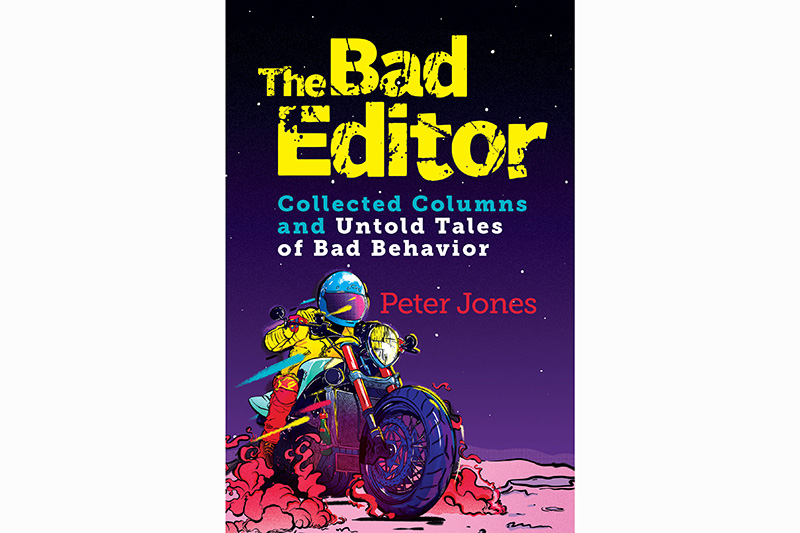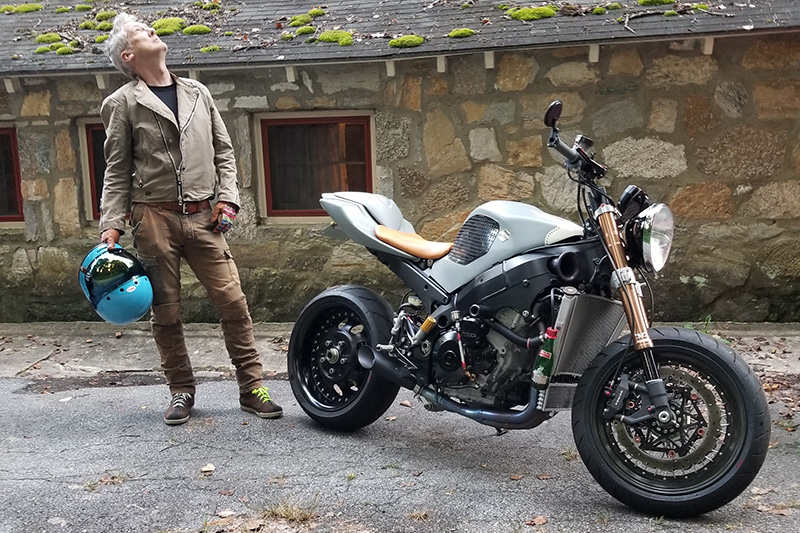
We all fight a battle between our opposites selves, between good and evil, between our inner demon and our inner angel. No one is all good or all bad. It’s the vast area in the middle where things get interesting.
When it came to reviewing Peter Jones’ new book, “The Bad Editor: Collected Columns and Untold Tales of Bad Behavior,” I knew I would be biased. I know Peter. I like Peter. We’ve shared lots of laughs and drinks over the years at motorcycle press launches. When I took over as editor-in-chief of Rider, Peter reached out to me and offered to help. Now he writes a monthly column in Rider called “The Moto Life.”
So I asked Denis Rouse, Rider’s founding publisher and a guy who loves reading as much as he loves riding, to review Peter’s book. Denis doesn’t know Peter. Denis is unfiltered and likes controversy. He’s also been in the trenches of the motorcycle industry. Who better to review a book called “The Bad Editor”?
But after reading the review Denis sent me, I knew we needed to zoom out, to take a wider view.
We need interesting people in this world to save us from the khaki-slacks and white-Camry dullness that will swallow us whole if we don’t pry open its jaws and kick out its teeth. Interesting people are complicated. As Whitman would say, they contradict themselves, they are vast and contain multitudes.

Peter is interesting. He has a degree in fine arts and used to work in a museum. He started road racing in his 30s. He had a engine throw a rod between his legs at 199 mph on the Bonneville Salt Flats, just missing his chance to join the 200 MPH Club (and luckily escaping without grievous bodily harm). But he later joined the club, clocking 202.247 mph from a standing start on a naturally aspirated production motorcycle at Maxton AFB. Peter has written for every major motorcycle magazine and worked for Pirelli, Öhlins, Kymco and Nitron. He’s written academic papers on philosophy and an as-yet-unpublished book about risk. He’s working on a graphic novel. He’s restoring a 1962 Benelli Sprite 200. Peter also an eclectic taste in shoes. I don’t think I’ve ever seen him wear the same pair twice.
You get the idea.
Peter’s new book has a Dr. Jekyll and Mr. Hyde quality to it. The first 150 pages are devoted to 30 columns he wrote between 1996 and 2002 for Sport Rider, Motorcyclist, American Roadracing and Motorcycle Street & Strip. Many of the columns are about road racing — the mindset of racers, crashing, backmarkers, G-forces and so on.
As Denis puts it: The chapters on road racing are excellent, in particular the one in which our man describes riders of unworldly skill who walk a track before a race and engrave the geometry in their minds to achieve a subconscious sense, some say even a spiritual sense, to negotiate the course at terrifying speeds and lean angles and braking forces that bend the science of physics. Then there’s this painful chapter on expiating guilt that deals with the time Jones crashed his bike in a road race, causing the rider just behind him to do a career-ending crash, that rider being Stewart Goddard, who despite being paralyzed from the chest down as a result of an early moped accident, was doing well enough on the circuits to be an icon at the time. I’m human. I know guilt. How does Jones handle it? I remember how Graham Greene defined its opposite, innocence, as “a blind leper who has lost his bell, wandering the world, meaning no harm.”
There are also columns about lane-splitting in Los Angeles traffic, being mesmerized by a Supercross race in Las Vegas (a city he fears and loathes), “The Art of the Motorcycle” exhibit at the Guggenheim, owning a clapped-out CB350 and why you should never try to ride a motorcycle with 15 pounds’ worth of brake rotors in a bag slung over your arm, all of which are well-written, thoughtful and entertaining.
Dr. Jekyll is the good guy, the responsible one. He’s not the interesting part of the story. It’s Mr. Hyde’s 19 “Untold Tales of Bad Behavior” that people really want to read.
According to Denis: Jones stirred memories of my own from years as Rider’s publisher of which I’m not particularly proud. Like the time we drove a rental car on the beach in and out of the salt of the surf wash during Daytona Speed Week. Like when I was drinking Lone Stars with tequila shooters at the bar in Gilley’s during the Houston Motorcycle Show and became convinced by colleagues and Harley execs that I could ride the mechanical bull at gringo level without a serious get-off. And the time we were seated at an entertainment club featuring female impersonators, and one of the entertainers came to our table and, well, I won’t go on here, it’s Jones’ book not mine, but there’s related dubiousness in it that’s plenty familiar to me.
What enthusiasts often want to know is, “What really happens at motorcycle press launches?” They don’t care about the 48 hours of travel to spend 36 hours on the ground in Spain to ride a motorcycle for 100 miles. They aren’t interested in how many photo passes you had to do to get the shot, or that you had to ride a motorcycle with DOT tires on a track in the rain. They want the trench coat opened and the naked truth revealed.
Because Peter has a solid moral core, is not out to settle scores and doesn’t name names, his tales of bad behavior feel restrained. The tales lack the prurience we all crave. Peter is self-effacing, humorously pointing out his own foibles and errors in judgment, but the veil of anonymity that protects the not-so innocent left me hungry for more details, for the who, what, when, where and why of what transpired.
Where Peter is more open, though again without pointing fingers at a particular person or brand, is about the delicate balance motojournalists maintain to serve different masters: editors, publishers, readers, advertisers, manufacturers and themselves.
Back to Denis: What rings especially true in the book, and it’s a subject Jones deals with eloquently on several levels as an insider, is the pressure advertisers put to bear on the shoulders of a motorcycle journalist to retain integrity (read: honesty) in the test reporting of machines and related accessories and riding equipment. Advertising is important. The ship goes down without it. But Jones knows it sinks faster when readers no longer trust it.
Motorcycle magazines (and websites) are enthusiast publications. There is a symbiotic relationship between all parties involved, yet the rules of that relationship are not written down or set in stone. As Peter told me in our recent podcast interview, when journalists are reviewing the advertisers’ products, there’s an inherent conflict of interest. Readers want motojournalists to be honest, but only when that honesty aligns with their own biases. When a reader’s favorite motorcycle doesn’t win a comparison test, the reader will sometimes accuse the editors of the magazine of being “in the pocket” of the winning manufacturer, rather than accepting the conclusion that the motorcycle in their garage isn’t the best/fastest/coolest.
As I know from personal experience, no staff editor at a motorcycle magazine gets rich doing their job. It’s a labor of love. Sure, free helmets are involved, but try paying rent or buying groceries with a used helmet and let me know how it turns out for you.
Peter isn’t a bad guy, not in a moral sense, but he has found himself in bad situations.
Denis: The ironic capper comes in the last chapter of the book in which Jones leads several police officers in a life-threatening chase on the Blue Ridge Parkway. He was speeding way over the posted 45, in a national park no less, when he caught the pursuant attention of the law. The deal ends at a dead end, and Jones is promptly arrested, ordered to lie prone on the ground with his hands cuffed behind him, with an officer’s knee planted on his back. Off he goes to the Graybar Hotel. End of book.
Was a felony conviction added to his resume? He says no but more detail to come in Volume II of “The Bad Editor.”
I’m just jonesing for it.
We need people like Peter Jones in the motorcycle industry. We don’t pay him enough to write his monthly column. So buy his book. Buy two and send one to a friend.
“The Bad Editor: Collected Columns and Untold Tales of Bad Behavior” is 250 pages, and is available in paperback for $18.55 or as a Kindle e-book for $7.99 on Amazon. To read sample chapters and find out more about Peter Jones, visit TheBadEditor.com.







